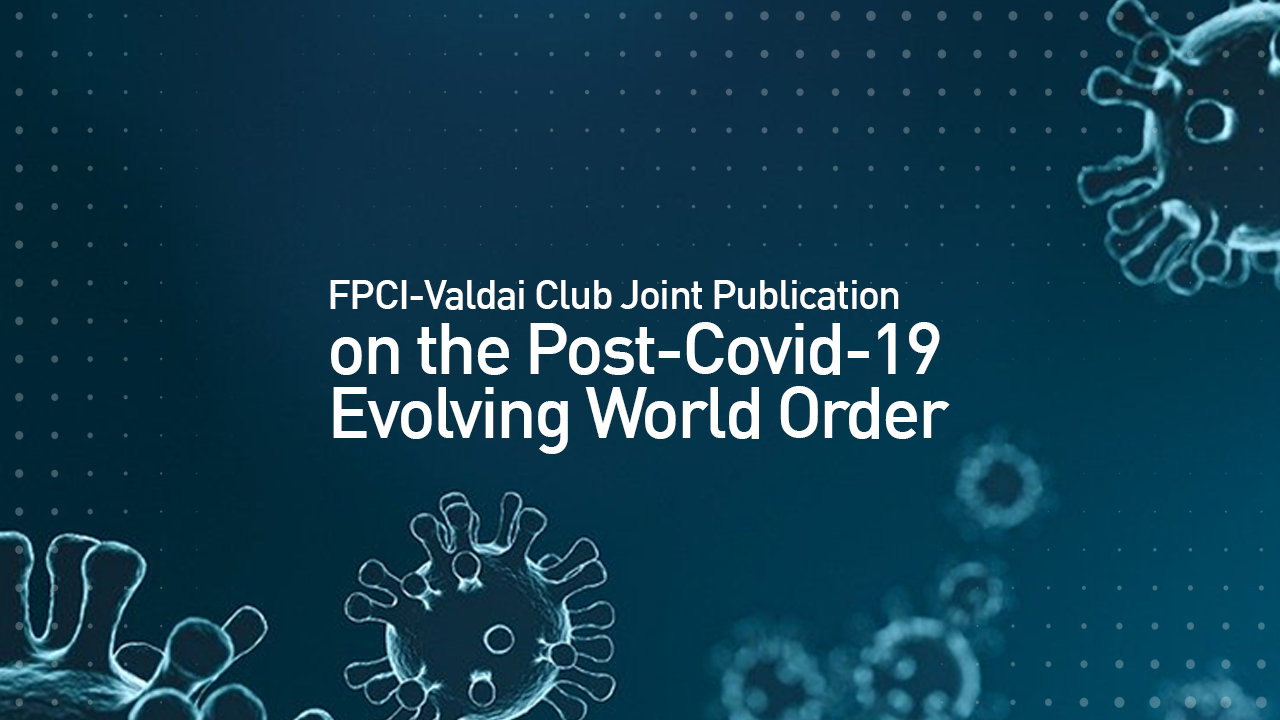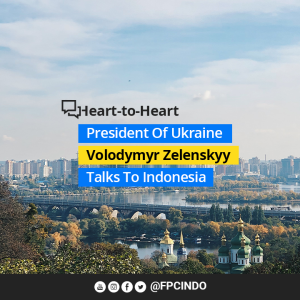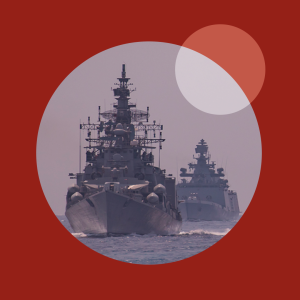FPCI-Valdai Club Joint Publication on the Post-Covid-19 Evolving World Order
 H.E. Nadjib Riphat Kesoema
H.E. Nadjib Riphat Kesoema
Jakarta, October 2020
All nations of the world are awaiting the end of the COVID-19 pandemic. Needless to say, it seems that the coronavirus will stay with us for a long time to come. This pandemic has taken more than one million lives and affected more than 40 million individuals. It is an unprecedented period where leaders of the world race to create strategies to protect their nation against further spread of the disease – a time where governments are pushed into crisis management mode, struggling to maintain the delicate balance between saving lives and livelihoods. A period requiring, more than ever before, solid engagement, communication, cooperation and sharing of ideas between nations to prepare for post-pandemic economic and social recovery.
The post-Covid-19 world will certainly be different. The nature of the pandemic and its requirement of strict social distancing have caused somewhat a decline in the dynamics of relations between countries – international conferences are delayed, meetings have been stalled, and high-level visitations are replaced by virtual alternatives. Interactions between countries will be influenced by their attitudes and positions during the pandemic, whether they became a friend in need, or a distanced neighbour. The approach taken today dictates the kind of world that we will inherit in the post-pandemic future.
What kind of world do we want to inherit?
There is too much at stake to opt for positions which may worsen the general outcome. For this reason, we cannot forget that we are now living a global world; interconnected and interdependent. Many have shown this spirit of solidarity by providing assistance in the form of personal protective equipment and medicines to countries in need, but on the other hand there are also nations with leaders displaying narrow nationalism by prohibiting the export of medical supplies and medicines, or blocking the cross border transportation of goods desperately needed by other countries. This is not the time for any actions of withdrawal and inward nationalism.
On a brighter note, history has taught us that global crises often plant the seeds for large scale cooperation – the first World War gave us the League of Nations and the second World War, the United Nations. If we follow the historic footsteps, this pandemic may present a unique opportunity for the world to further champion the agenda for international cooperation. From what we see thus far, we are currently on the right track. For one, international aid has come pouring in for countries in need with a total sum that reaches billions in dollars.
We are also seeing positive early response from members of the G20 soon after the pandemic was announced. This includes Indonesia who, together with the members of G20, issued a Ministerial statement underlining their continuous effort in ensuring the flow of goods, availability and accessibility of essential medical supplies, as well as collectively support MSMEs initiatives at large. In addition to this, even amidst trade tensions, a group of seven countries (New Zealand, Singapore, Canada, Australia, Chile, Brunei, and Myanmar) have also came forward with their commitment to keep their supply chain open and remove any restrictive measures on essential goods, especially medical supplies.
Despite these positive evidences, it is worth asking how this call for cooperation actually translates into reality. Inevitably, there are existing hints indicating that crises often bring the inherent nature of each countries’ self-interest – it forces countries to prioritize domestic demand; giving rise to competition rather than cooperation. This can be directly seen from the politicization of international aid in the case of Spain, one of the hardest his countries by the pandemic. In times of dire need. its attempts to procure supplies was blocked – the shipment of hundreds of respirators purchased with Spain’s three-region joint health endowment was being held by the Turkish government. Another example is Italy who, having requested medical supplies from its nearest neighbours, could not obtain any from Germany and France due to said products being for exports. On the other hand, China being the country with relatively the most experience in dealing with the pandemic has implemented a ‘mask diplomacy,’ revealing how distant acquaintances can also be a friend in time of needs. This crisis has indeed shown how dependent we are on the goods, information, and supplies from outside of our borders. No country is an island.
Championing international and regional cooperation
Therefore, we must carefully examine the frameworks of international cooperation that are currently employed. Take the United Nations as an example. As a world body that continues to seek solutions to global problems, the UN is an important forum for discussion of humanitarian issues in all its entirety, including dialogues on the Covid-19 pandemic. It is the United Nations’ duty to mobilize global leadership in fighting the common war against the pandemic. The value of multilateralism must continue to be developed in the face of the rampant that threatens everyone in all corners of the Earth.
In light of the United States and China rivalry, incidents such as Donald Trump’s threat to freeze funding for the World Health Organization (WHO) after he accused the institution for being “Chinese-centric” has made the continuity of the operational function of this body vulnerable. With an estimated contribution of 20% of the WHO’s total budget, the US was the largest single government donor of the world. Due to WHO’s critical role in leading an informed global response against the pandemic, it is imperative that it continues to have the support of the global community to carry out its duties. While arguments linger over the accusatory bias that the UN received from the US, there is no doubt that the WHO, with its global network of public health experts and scientist, has been exemplary in providing sound guidelines in response to the pandemic, fighting misinformation that arises around the world.
We should also seek to strengthen framework of cooperation in the regional level. The efforts made by policy makers at the regional level is crucial in forming an inter-regional circuit arrangement which in turn forms a new international relations system. This reciprocal caring within the region by its leaders will bear testament to the importance of multinational cooperation in these unprecedented times.
The emergence of Covid-19 as a global crisis has activated the ASEAN health sector cooperation mechanisms. Collaboration is carried out in forms of information, experience, and best practices sharing into optimize the handling of Covid-19. Such cooperation activities is are also joined by ASEAN dialogue partners such as the US, China, Japan, South Korea, Australia and the European Union.
One of the key strategies for ASEAN to enhance its pandemic cooperation is via its trade policy. Out of 38 Covid-19-related trade measures issues by ASEAN member states, 23 of them are liberalizing (temporary elimination of taxes and import duties) and 15 were restrictive (temporary export prohibition) on medical supplies and certain PPE gears. Commitments to keep open lines for flow of necessary goods is echoed in the ASEAN Economic Ministers (AEM) statement on Strengthening ASEAN’s Economic Resilience in Response to the Outbreak of COVID-19 on 10 March 2020, ASEAN Ministers on Agriculture and Forestry (AMAF)on 15 April 2020, Declaration of the Special ASEAN Summit on COVID-19 on 14 April 2020, and the Hanoi Plan of Action on Strengthening ASEAN Economic Cooperation and Supply Chain Connectivity in Response to the COVID-19 Pandemic on June 2020.
As the largest country and economy in Southeast Asia, Indonesia leads by example. It has an extensive membership in various groups both regional and the global such as ASEAN, Non-Aligned Movement, G-20, G-77, OIC, and the experience in participating in various stages of solving world problems. By having the right platform for dialogue and the right experience any country will be in the best position to bring change and deliver solution.
Vaccine for all?
Indeed, many have argued that the prognosis of a post-pandemic future will largely depend on the availability of vaccines. On this front, it is encouraging countries such as Russia and China, those who are leading in the vaccine development race to collaborate with other countries in procuring, distributing and producing said vaccines. Nevertheless, the US has flat out rejected to work together with other nations despite the fact that helping hands like these are extremely vital to put an end to this pandemic.
Only with the support by the global community that we can collectively ensure that vaccines will one day be available for all. Indonesia, together with more than 170 countries, have joined the WHO’s COVAX global coalition for vaccine plan that aims to distribute immunization shots for COVID-19 fairly and justly across the world. In efforts to make vaccines available for all, it is precisely this kind of cooperation that should be held integral in times of crisis.
A brighter post-pandemic global relations
Every crisis has another side – opportunity. The silver lining of the COVID-19 outbreak seems to be the accelerated adoption of a new approach in international relations: humanity and kindness. Observing the level cooperation over the course of the pandemic on both the regional and global level bring the realization that, essentially, the future of global relations should follow the pattern of today.
The period post Covid-19 will be a brighter and more beautiful horizon, should all players on the global stage continue to commit themselves in eliminating selfishness, momentary interests and narrow nationalism. Valuable lessons of cooperation and mutual assistance learned during the course of this pandemic must be used to build our future values upon. All unhealthy competition rejected, and self-focused ideas challenged.
This pandemic has truly demonstrated that the world cannot just be led by only a few strong players. The world needs muscles through countries that can react fast to overcome new and unprecedented issues facing the world. This post pandemic world will no longer require the idea of globalization as we know today. It demands a new type of globalization and leadership that places humanity front and centre, building hundreds of bridges and tearing down each and every wall. There is no more place in this world for a single wall.
The past half year has witnessed a lot of sacrifices, but also tolerance & assistance poured into the right place, regardless of the differences in ideological, political and regional backgrounds. All steps, actions, strategies and visions seem to be taken for the safety and welfare of all humanity. It is with this attitude that the world should approach current and future global phenomenon and issues, be it diseases, natural disasters, climate crisis, food insecurity, or various other threats.
From this pandemic, we also learned how intra-regional organizations play an important role in stabilizing conditions and strengthening each other in the region. Intra-regional organizations that are able to maintain the stability and integrity of their members states will provide an invaluable contribution to the post pandemic world.
Simply said, no country can survive this pandemic alone. It requires a collaboration of a collective and collegial global leadership to work together to rebuild better a world that is based on shared values of caring, sharing, justice, balanced inclusivity and mutual welfare. If we succeed in creating this new world order, we can indeed look forward to a brighter post pandemic global relations.
Jakarta, 19 October 2020
Ambassador Nadjib Riphat Kesoema

Ambassador Nadjib Riphat Kesoema is a Fellow of the Foreign Policy Community of Indonesia. Ambassador Kesoema started his diplomatic career in 1982. He served as Indonesia’s Ambassador to Australia and Vanuatu from 2012 to 2017. Previously, Ambassador Kesoema was Deputy of the Coordinating Minister for Political, Legal and Security Affairs (2010-2012) and Indonesia’s Ambassador to the European Union, Belgium and Luxembourg from 2006 to 2010. Before that, he was the Head (Director) of Center for Education and Training at the Ministry of Foreign Affairs of Indonesia.
As a career diplomat, he was assigned overseas to Oslo (1986), Vatican City (1992) and Canberra (1999). Furthermore, he has also chaired international conferences as well as represented Indonesia in many international forums. Ambassador Kesoema received the Bronze, Silver, and Gold Service Award from the Indonesian President, four cultural awards from Belgium and Province of Bali, as well as the Order of St. Gregory the Great II from The Holy See. Presently, Ambassador Kesoema also serves as the Chairman lf the Advisory Board of IPMI International Business School. He is married to Nino Nadjib Riphat, with two daughters and two granddaughters.
On Distance and Synchronicity in the ‘New World’ by Dr. Yaroslav Lissovolik





